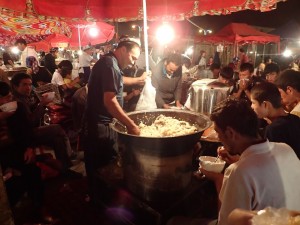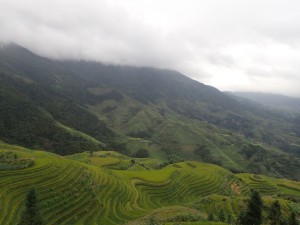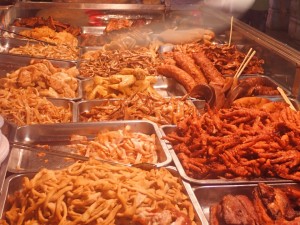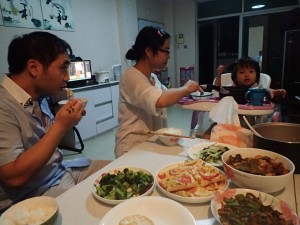The border between Kyrgyzstan and China is a bit strange. The first 140 km on the Chinese territory are forbidden. To cross them we had to take a cab which was very expensive. And to be sure we cooperate, our passports were confiscated. The taxi driver kept it until the last border control where finally we got our stamp. We stopped at least six times only for check. We spent all the afternoon in crossing the border, fortunately in the taxi, we were with two Dutch tourists, father and son. They managed the negotiations with the driver until Kashgar and they found an accommodation for us ! But what a annoying and tiring day !
We found with pleasure a living city where the temperature is largely more than 20 ℃. People are outside, there are all sorts of shops and we could find everything. Restaurants are numerous, Chinese people eat mostly outside. On the evening, they go to the night market. We loved it, it was very cheap and the food was various, everyone could find what he wanted. Furthermore, we could see in advance what we ate, easier than the menus !
The streets are full of scooters. They are quiet because they are electrical but their horn were always working and without reason. There were a big difference with Tajikistan, it did us good !
However, our arrival in Kashgar was astonishing. Were we really in China ? People looked like Central Asia people. Kashgar is located in Xinjiang region also called Oriental Turkestan. Here the Uighur people are predominantly living or were predominantly living because since 1949, the Chinese government are progressively colonizing the region by sending Han people (predominant ethnic group in China). The purpose is to deculturize the region. For more than 1000 years, Uigjur people lived independently here. Like Uzbek or Turkmen people, they are Turco-mongol. But since 1884, Xinjiang has been annexed by China. They tried several times to retrieve their independence but unsuccessfully. The strains between Uighur and Chinese people are numerous. We often had been checked when we travelled, even at 3 a.m. in a coach. As the region is rich in important natural resources, China want to keep it. Especially, it owns the most important of oil, gas, coal and uranium.
For our four days break in Kashgar we planned our itinerary. Our first plan was to visit the region near the tibet but we changed our mind. The weather was too bad and we had enough of pass at more then 4000 m. We realized that China is so huge 1 We had to choose, not easy! At the hostel we met Édouard, a french expatriate guy who teached us lot of things about China and advised us.
We left the region with a night coach (sleepers) of 23h, a first train of 35h and a second of ..h with hard sit toward Guilin 5700 km further. We made a small break of 24h in Xian. Our bicycles and our stuff had been sent separately. In China the sending system by train is efficient!
We got back our bicycle in Guilin in the Guangxi region. We made a three days trip to discover the wonderful rice terraces located in the Jing Ken valley.
Today, this valley is a touristic natural area. There are about ten villages, we choosed to stay in one named Dazhai. When we arrived, we are called out by small and pretty old women wearing a magenta jacket with unbelievable long hair styled in the same way. She asked for we came in their hotel but we continued. In the village, a young lady with a baby offered us a room. The price was correct and it was at home, we were charmed. We took a great lunch before walking in the terraces. When the women learned we are french, she showed a book “Tian Tou dernier village avant le ciel” (Tian Tou dernier the last village before the sky) of Jean Claude Raoul. This booked changed our day and our view of the place. It tell the story of Yaos. This population were discovered in 1994 by the Chinese journalist and photographer Li Yashi. Fallen in love with this people and its region, he often came back for 20 years. The first rice terraces were sculpted in the mountains 700 years ago. When he discovered them, Yaos were extremely poor. The yield of their terraces was low, they had not enough to eat. During the Great Leap Forward (1958-1960) on 80 people in the village, 18 died of hunger.
According to Li Yashi, the splendour of the landscapes was a great advantage, only tourists could help this people. He built a first small hotel and later made a documentary. The development was quite slow at the beginning. With the coming oh the tourists, Dazhai was disrupted. In 2002 the electricity arrived and the building of the road allowed to open the valley up. Today, hotels are numerous and new ones are building. A cable car was set up in 2012. Now the long hair women fight to carry the luggage and fill their hotels. The Yaos don’t work almost anymore in their fields, they are too busy with the tourists. They take on external workers.
Some of them think that money make their heads spin, that it was too fast and traditions are disappearing. The elderly people still wear the traditional clothes but the new generation seems not interested. Other ones are very happy to live better. Thanks to the book, we knew the grandfather who lives our homestay is shaman. We don’t know what to think about this fast evolution which seems not to stop.
We came back to Guilin for few days. We enjoyed to stroll in the cities, everything seemed to be different in China. For the first of our trip, it was difficult to communicate with people, nothing worked. The few words we knew didn’t help because our pronunciation often was bad. The numbers made with hands were not the same and write was useless. Don’t ask them to speak with gestures, only children or simpletons make it. This made some misunderstandings when we order our meals!
The food is different but incredibly tasty. Don’t watch out for cleanliness of the kitchens. All the time, the rating is C, the worst. Despite that we were not sick anymore. There are some dishes that we didn’t test : heads of animals and other wired stuffs. It was frequent to see alive animals in front of the restaurants. It was possible to chose your chicken or your fish that you want to eat. We also saw turtles sellers on the side of the road, they eat them for the important events. In the cities, poodles and pekingese dogs are groomed but in the countryside dogs aren’t often more than one year. They are bred to eat during the great events.
Among the differences, the use of toilet paper. It’s everywhere except in the toilet! How the Chinese people wipe themselves ? We still don’t know. By the way, toilets are like the restaurants, they are really dirty. The lack of hygiene made us a bit uncomfortable during our stay. We were also surprised by different behaviours, they yawn or they stretch themselves loud. Belching is not a problem à d cleaning your earrings publicly too. Spitting the food out on the table is common and make noise when you are eating means it’s delicious! In the train, trashes often are thrown on the floor. It must be said everything has too many wrappings. After several days we got used to this habits.
We decided to reach the west coast with bike, to dis over the Chinese countryside. Even if we found an exotic vegetation and new smells, we saw only similar landscapes and we didn’t met anybody. After six days, we arrived in Chenzhou, the most pleasant city for us. It was not to big and for the first time we talked with very friendly locals.
As the countryside road were boring, we decided to change our plan. We sent our bicycles to Xiamen our final destination. We didn’t go directly there, we wanted to discover another town. We chose Ganzhou, not too big, perfect. We bought a train ticket to Ganzhou and a second one Xiamen. After 4h in the train we arrived, the city is huge. We understood immediately that We were not in Ganzhou but in Guangzhou. With a difference of two letters and a similar pronunciation, the ticket seller didn’t understand. Fortunately, there was no impact on the rest. We laughed a lot!
In Xiamen we met Rita, the only local with who we could really talk, exchange and ask questions. We spent two days with her family. She showed to Fanchon some of her recipes and she talked about China. She helped us to take our ferry ticket on time and managed the receiving of our bicycles in hurry because it’s difficult for us to be understood. In China, tourism is essentially developed for Chinese people and they are very numerous. They are the same that we can see in France, in group, staring at their cameras ! By the way, we became sometimes a sightseeing for them, with or without our bicycles. Women often tried to touch Fanchon. We had sometimes the feeling to be monkeys. It’s hard to stay kind in these situations.
For the first time of our trip, we discovered a really exotic country. It’s almost another world or a world in the world. China is at the same time fascinating and disconcerting! In spite of the few meetings, this months was rich in discoveries. We left China on October the 6th and we sailed to Taiwan.




